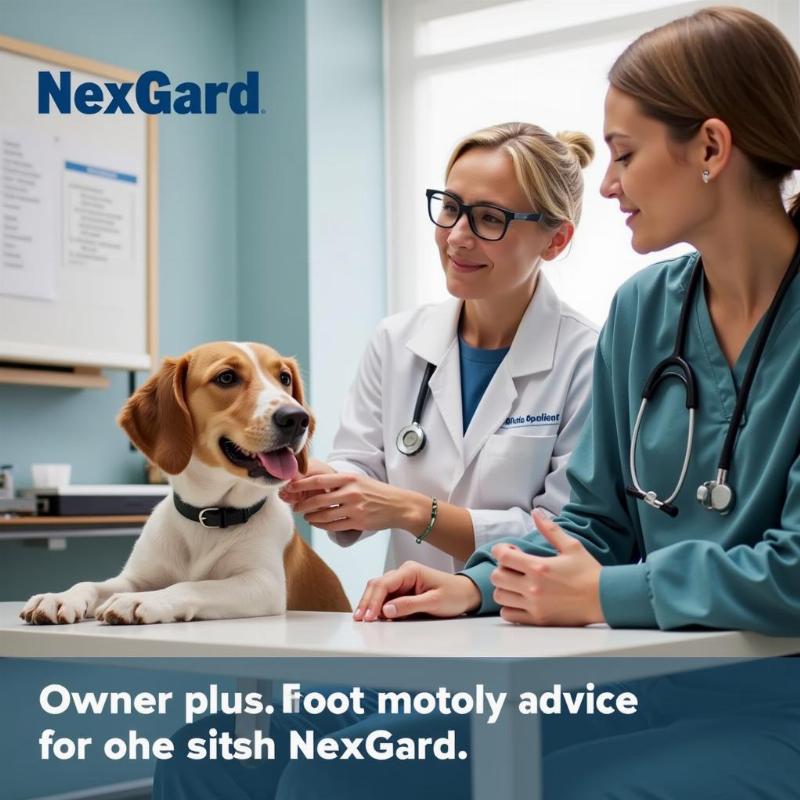NexGard, a popular flea and tick preventative for dogs, is generally considered safe when used as directed. However, like any medication, it can have potential side effects, and understanding these is crucial for responsible pet ownership. This article dives into the safety of NexGard for dogs, addressing common concerns and providing valuable information for pet owners in the United States.
Understanding NexGard and its Active Ingredient
NexGard contains afoxolaner, an insecticide and acaricide that works by disrupting the nerve signals of fleas and ticks, ultimately leading to their paralysis and death. It’s a beef-flavored chewable tablet, making administration easy for most dog owners. The dosage is based on weight, and it’s important to follow your veterinarian’s recommendations. While generally safe, some dogs may experience mild side effects.
Potential Side Effects of NexGard for Dogs
While most dogs tolerate NexGard well, some potential side effects have been reported. These are typically mild and transient, including vomiting, diarrhea, lethargy, decreased appetite, itching, and dry skin. In rare cases, more serious neurological side effects like tremors or seizures have been reported.
Is NexGard Safe for Puppies and Pregnant Dogs?
NexGard is approved for use in puppies as young as 8 weeks old and weighing at least 4 pounds. However, it’s crucial to consult your veterinarian before administering NexGard to puppies, especially very young or small breeds. The safety of NexGard during pregnancy and lactation in dogs has not been fully established. Therefore, it’s recommended to discuss alternative flea and tick prevention options with your veterinarian if your dog is pregnant or nursing.
NexGard and Pre-Existing Health Conditions
If your dog has pre-existing health conditions, particularly neurological disorders, it’s essential to discuss the use of NexGard with your veterinarian. They can assess your dog’s individual risk factors and determine if NexGard is the appropriate choice. Open communication with your vet is key to ensuring your dog’s safety.
 Consulting a Veterinarian about NexGard
Consulting a Veterinarian about NexGard
When to Seek Veterinary Attention
While mild side effects are usually self-limiting, it’s important to contact your veterinarian if your dog experiences any unusual or concerning symptoms after taking NexGard. If you observe signs like persistent vomiting, diarrhea, tremors, seizures, or any other neurological abnormalities, seek immediate veterinary attention.
Alternatives to NexGard
Several alternatives to NexGard are available for flea and tick prevention in dogs. These include other oral medications like Bravecto, Simparica, and Credelio, as well as topical treatments like Frontline Plus and Advantage II. Your veterinarian can help you choose the best option based on your dog’s individual needs and health status. For more information on comparing NexGard with Frontline Plus, you can read our article: nexstar vs frontline plus for dogs. You can also learn about using beef head skin as a treat for your dog here: beef head skin for dogs.
Conclusion
NexGard can be a safe and effective flea and tick preventative for dogs when used as directed. However, understanding the potential side effects and consulting your veterinarian are crucial for responsible pet ownership. Open communication with your vet, careful observation of your dog after administration, and prompt action if any concerning symptoms arise are essential for ensuring your dog’s well-being.
FAQ
- Is NexGard safe for all dog breeds? While generally safe, consult your vet, especially for puppies or dogs with pre-existing health conditions.
- What should I do if my dog vomits after taking NexGard? If it’s a single episode, monitor your dog. If it persists, contact your vet.
- Can I give NexGard to my pregnant dog? Consult your vet for alternative options during pregnancy and lactation.
- How often should I give my dog NexGard? NexGard is given monthly.
- What are the signs of a severe reaction to NexGard? Tremors, seizures, and persistent vomiting or diarrhea require immediate veterinary attention.
- Are there any natural alternatives to NexGard? Discuss natural flea and tick prevention methods with your veterinarian.
- Can I use NexGard with other medications? Inform your veterinarian about all medications your dog is taking.
Beautdogs.us is your trusted resource for comprehensive and engaging information on dog care and companionship in the US. We offer expert advice on breeds, grooming, nutrition, training, and much more. Whether you’re a first-time dog owner or a seasoned pro, Beautdogs.us is your go-to source for all things canine. Contact us at [email protected] or call us at +1 501-555-7529.